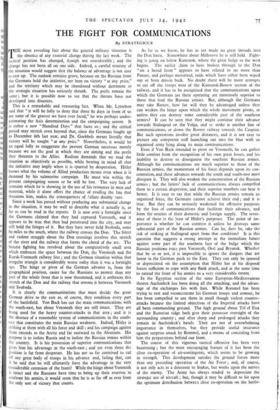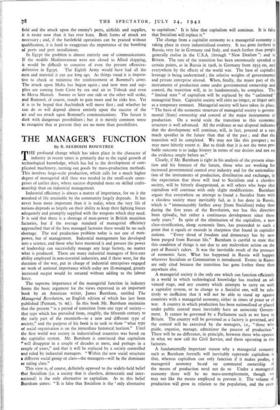THE FIGHT FOR COMMUNICATIONS
By STRATEGICUS
THE most revealing fact about the general military situation is the absence of any material change during the last week. The tactical position has changed, though not considerably ; and the change has not been all on one side. Indeed, a careful scrutiny of the situation would suggest that the balance of advantage is not easy to cast up. The outlook remains grave, because on the Russian front the Germans hold the initiative, are bent on victory "at any price," and the territory which may be abandoned without detriment to the strategic situation has seriously shrunk. The perils remain the same ; but it is possible now to see that the threats have not developed into disasters.
This is a remarkable and reassuring fact. When Mr. Lyttelton said that " it will be folly to deny that these 8o days in front of us are some of the gravest we have ever faced," he was perhaps under- estimating the Axis determination and the campaigning season. It is rather a new " Hundred Days " that faces us ; and the critical period may stretch even beyond that, since the Germans fought up to December 6th last year, and Dr. Goebbels meant literally that victory will be sought " at any price." Nevertheless, it would be an equal folly to exaggerate the present German successes merely because we see the goal at which they are aiming and the perils they threaten to the Allies. Realism demands that we read the situation as objectively as possible, while bearing in mind all that the initiative may imply when it is spurred by desperation. Hitler knows what the volume of Allied production means even when it is dammed by his submarine campaign. He must win within the present campaigning season or he will be lost. The very lack of restraint which he is showing in the use of his resources in men and material, while it alone offers the chance of evading the fate that threatens him, makes the consequences of failure doubly sure.
Since a week has passed without producing any substantial change in the situation, it may be well to describe what it actually is, as far as can be read in the reports. It is now over a fortnight since the Germans claimed that they had captured Voronezh, and it appears to be true that they had penetrated into the city, and may still hold the fringes of it. But they have never held Svoboda, some 6o miles to the south, where the railway crosses the Don. The bitter and violent struggle about the Don crossings involves this stretch of the river and the railway that forms the chord of the arc. The fiercest fighting has revolved about the comparatively small area which embraces the space between the Don, the Voronezh and the Kursk-Voronezh railway line ; and the German situation within that irregular triangle is considerably worse today than it was a fortnight ago. The hinge or pivot of the German advance is, from the geographical position, easier for the Russians to protect than any part of the whole front that is now threatened, and it embraces this stretch of the Don and the railway that crosses it between Voronezh and Svoboda.
It is clearly the communications that must decide the great German drive to the east as, of course, they condition every part of the battlefield. Von Bock has cut the main communications with the south-east, but about Voronezh they are still intact. They are being used for the heavy counter-attacks in that area ; and it is the absence of a reasonable system of communications in the south- east that constitutes the main Russian weakness. Indeed, Hitler is striking at them with all his force and skill ; and his campaign against them extends to the Arctic and far eastward to the Aleutians. His purpose is to isolate Russia and to isolate the Russian armies within the country. It is his possession of superior communications that gives him his advantage in the south-east ; and yet even there the position is far from desperate. He has not so far contrived to cut off any great body of troops in his advance and, failing that, can it be said that he will ultimately have the advantage in the very considerable extension of the front? While the hinge about Voronezh is intact and the Russians have time to bring up their reserves to confront his armies, it would seem that he is as far off as ever from the only sort of victory that counts.
As far as we know, he has as yet made no great inroads into the Don basin. Somewhere about Millerovo he is still held. Fight- ing is going on below Kamensk, where the great bulge to the west begins. The earlier claim to have broken through to the Don "on a broad front " appears to have related to no more than Panzer, and perhaps motorised, raids which have either been wiped out or been driven back. No doubt there will be more attempts to cut off the troops west of the Kamensk-Rostov section of the railway, and it has to be recognised that the communications upon which the Germans are there operating are immensely superior to those that feed the Russian armies. But, although the Germans may take Rostov, how far will they be advantaged unless they can weaken the hinge upon which the whole movement pivots, or unless they can destroy some considerable part of the southern armies? It can be seen that they might continue their advance towards Stalingrad on the Volga, and so strike at another line of communications, or down the Rostov railway towards the Caspian. But such operations involve great distances, and it is not easy to picture any competent staff launching out into the blue with an organised army lying along its main communications.
Even if Von Bock intended to pivot on Voronezh, he can gather little comfort from the recognition of his own great losses, and his inability to destroy or disorganise the southern Russian armies. Although his communications are much superior to those of the Russian armies, the momentum of his force depends upon its con- centration, and these advances towards the south and south-east must dissipate it. They will also weaken the concentration of the Russian armies ; but the latters' lack of communications always compelled them to a certain dispersion, and their superior numbers can bear it better. It is easy to say that while the Russian armies remain an organised force, the Germans cannot achieve their end ; and it is true. But they can be seriously weakened for offensive purposes by the loss of communications that facilitate their advance, and form the arteries of their domestic and foreign supply. The sever- ance of these is the !east of Hitler's purposes. The point of im- portance is whether he can contrive it unless he destroys some substantial part of the Russian armies. Can he, dare he, take the risk of striking at Stalingrad apart from that condition? It is this question that suggests a strong attempt in the immediate future against some part of the southern face of the bulge which the Russian positions trace past Voronezh, Orel and Bryansk. Whether that be so or not, it is impossible to ignore the dangers that are latent in the German push to the East. They can only be ignored or depreciated on the assumption that Hitler has at his disposal forces sufficient to cope with any flank attack, and at the same time to extend the front of his armies to a very considerable extent.
In the Egyptian section of the same European-Mediterranean theatre Auchinleck has been doing all the attacking, and the advan- tage of the exchanges lies with him. While Rommel has been trying to rest and reconcentrate his German troops and armour, he has been compelled to use them in small though violent counter- attacks because the limited objectives of the Imperial attacks have all been commanding ground. The high ground about Tel el Eisa and the Ruweisat ridge both give their possessor oversight of the surrounding country ; and after sharp and prolonged attacks they remain in Auchinleck's hands. They are not of overwhelming importance in themselves, but they provide useful insurance against surprise attack by Rommel, and a means of concealing from him the preparations behind our front.
The course of this vigorous tactical offensive has been very heartening ; but the most encouraging feature of it has been the close co-operation of air-contingents, which seems to be growing in strength. This development satisfies the ground forces more than any preceding operation of the Air Force ; and, of course, it not only acts as a deterrent to Stukas, but works upon the nerves of the enemy. The Army has always tended to depreciate the strategic use of aircraft ; but, though it may be difficult to hit upon the optimum distribution between close co-operation on the battle- field and the attack upon the enemy's ports, airfields and supplies, it is easier now than it has ever been. Both forms of attack are necessary ; and, if the battlefield operations can be praised without qualification, it is hard to exaggerate the importance of the bombing of ports and port installations.
In Egypt the problem is almost entirely one of communications. If the middle Mediterranean were not closed to Allied shipping, it would be difficult to conceive of even the present offensive- defensive in Egypt. The Eighth Army would have had all the men and material it can use long ago. As things stand it is impera- tive to check or minimise the reinforcement of Rommel's army. The attack upon Malta has begun again ; and now men and sup- plies are coming from Crete by sea and air to Tobruk and even to Mersa Matruh. Sooner or later one side or the other will strike, and Rommel, of course, stands to gain more and he risks less. Yet it is to be hoped that Auchinleck will move first ; and whether he can do so will depend almost entirely upon the success of the air and sea attack upon Rommel's communications. The future is dark with dangerous possibilities ; but it is merely common sense to recognise that at present they are no more than possibilities.



























 Previous page
Previous page